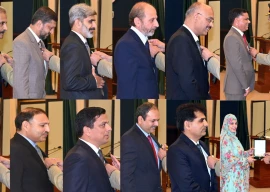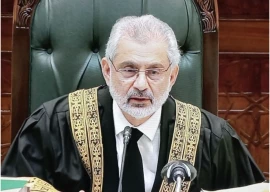
That it spends far too much on defence and not enough on education, healthcare and development is a fact that has been repeated ad nauseam in the national conversation. What is perhaps less well understood is the magnitude of the problem. The HRCP’s report uses budget data and utilises the undeniable truth of raw mathematics: the combined social sector spending of all federal, provincial and local governments in Pakistan is 24 per cent less than defence spending. It noted that while the defence budget is around Rs495 billion, in reality it comes to around Rs580 billion since military pensions are included under another category.
This statistic is alarming in itself, but it obscures some even more worrying trends. Several sectors are ignored entirely and many are inadequately funded. We do not agree with every recommendation in the report, but we do agree that if the nation is going to make any progress in improving the quality of life for the average citizen in the country, the government needs to allocate far more resources — monetary and otherwise — towards the social sector.
One factor that the report implied — but did not state explicitly — was the extraordinarily difficult manner in which the government presents its budget documents, which seem to be designed more to hide information than to illuminate where the taxpayers’ money is being spent. For example, the budget for military pensions is accounted for in the civilian budget. And the line item in budget documents that talks about defence spending does not include the costs of assisting the refugees who must flee their homes as a result of military operations. Furthermore, the report states that the figure does not include the costs of military cantonments, garrisons, or even the production of military equipment and ordnance. If the government caught a corporation with such shoddy accounting practices. The latter would face stiff penalties.
Apart from the concerns of accounting transparency, the government’s priorities when it comes to budget allocations are depressing. Flood relief in Sindh, for instance, has been allocated a paltry Rs280 million even though tens of thousands of people have yet to fully recover from the devastation of two massive floods in successive years. This is from a provincial government that has a habit of not spending the entirety of its budget allocations and returning billions of rupees every year to the federal government. How can they justify not spending on some of the most vulnerable segments of the population, especially when they actually have the cash?
Another more damning criticism is that when the government does spend money on the social sector, it does so in a very inefficient manner. The HRCP report highlights the case of subsidies, on which the government spent about Rs400 billion in the fiscal year that ended June 30, 2011, nearly as much as it spent on education and health combined. There is very little effort on the part of the government to ensure that, rather than spend the funds indiscriminately, they target those groups who need them most.
There are some aspects of the report that we disagree with. For instance, the HRCP calls for an increase in the monthly stipend received by families on the Benazir Income Support Programme as a solution for the project’s inefficiencies. One is not opposed to an increase in the stipend, but the programme should make the assistance conditional on families sending their children to school and subjecting them to vaccination, similar to the hugely popular and highly successful Bolsa Familia programme in Brazil.
Published in The Express Tribune, December 30th, 2011.
COMMENTS (6)
Comments are moderated and generally will be posted if they are on-topic and not abusive.
For more information, please see our Comments FAQ





































in desi style it is Guns vs Roti.
@Discostu: We can... We surely can if it comes to that... Competing and Standing up for your cause is different.. At the moment we don't need competition we just want our small forgotten favors to be fulfilled...
@Sher Khan: We spend more than 4%.. get the stats right.. America is the biggest economy and it can spend 20% while we are not even in the first 20'es according to the economy size.. And moreover Army is now ranked 9th on the corruption ranking Alhamdulilah...
@Sher Khan: The US is a superpower and we are an ant. We cannot compete with them. We can't even compete with India!
Yes but PAK has the bomb to protect itself from the nation it seems to keep wanting to attack...
Interesting choices the people of PAK make.
As imran khan said, there is roughly 8 billion$ worth of corruption in Pakistan. get that dam money to put into education and health sector. on top if we start having taxes collected properly, Pakistan gets close to 10 billion in taxes. use that money to invest. stop this propaganda that we spend so much money on defence. US spends 20% of its budget on defence and we spend close to offical 4%....
Great editorial right on target. We never stop talking in vague terms of corruption without being specific. The biggest corruption and immorality is unfair budget and lying about it. Most of the resources are spent on non-productive activities that do nothing for civilians. As long as a tiny economy like Pakistan has huge army with expensive WMD and other toys, the future of Pakistani civilians is doomed. The budget must be fair, transparent and debated in the assemblies openly and honestly. Thanks ET and HRCP, no wonder the rightwing apologists hate HRCP and other humane organizations.